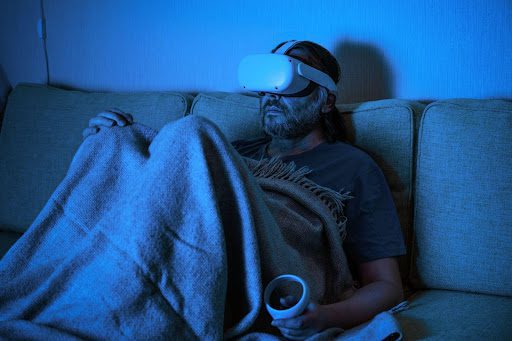Depression is a mood disorder affecting 3.8% of the world’s population, impacting their ability to work, go to school, and do daily activities. Among its other symptoms, individuals with depression may endure a persistent low mood, a loss of interest in enjoyable activities, sleep problems, and trouble concentrating. Virtual reality (VR) is one of several technology-based treatments showing efficacy for mental health disorders such as depression. While VR treatments are mostly in the exploration phase, they hold promise as effective future forms of therapy.
Read on to learn about the advantages and concerns of virtual reality treatment for depression. Then examine how several evidence-based therapies can utilize virtual reality to treat depression.

Technology is finding a more significant role in mental health treatment, and virtual reality is another innovative tool researchers and clinicians utilize more often.
Virtual reality is still not widely used in mental health treatment. But its advantages make virtual reality therapy a valuable consideration for depression treatment.
The future of depression treatment likely has a place for VR, and depression is not always responsive to traditional therapies. But there is some concern about using this technology.
Research evidence backs several virtual reality applications that may benefit individuals with depression. While these may not be established as stand-alone treatments yet, they may add value to treatment plans where it seems suitable and advantageous.
Psychoeducation is a part of therapy where individuals learn about their disorder and how it affects their lives. With or without treatment, high-quality psychoeducation helps individuals understand their situation better and can help reduce symptoms. With virtual reality, psychoeducation can evolve beyond conversations and traditional presentation formats. Learning about mental health becomes an immersive process, inviting individuals to step into scenarios and address their issues and concerns in reality-adjacent ways. The interactive nature of virtual reality helps individuals deepen their learning, shifting from passive learning to active participation. Virtual reality triggers the senses and involves body movement, evoking a greater connection to the experience.

Behavioral activation (BA) is a therapy that utilizes behavior as the primary mechanism for improving depression symptoms. This differs from most other depression therapies that focus on emotions and thought processes. Traditional BA combats the isolation that often keeps a person captive in depression with active engagement in the outside world. Clinicians may achieve this by immersing individuals in virtual social situations modeled after scenarios they might enjoy engaging in, such as a card game night or going to a music performance. Virtual reality allows individuals to pick situations that appeal to them rather than being limited to what is available in their local environment.
Cognitive restructuring is a commonly used technique of cognitive-behavioral therapy, a treatment that addresses the interaction of emotions, behaviors, and thoughts. In cognitive restructuring, the individual learns to observe their thoughts objectively, identify patterns that reinforce their depression, and make helpful changes. Clinicians help individuals examine their thought patterns during conversations in therapy, with learning worksheets, and via a daily journaling habit. Individuals often imagine or describe scenarios when evaluating thoughts, and virtual reality takes it a step further by utilizing lifelike situations.
Social skills training is a cognitive-behavioral technique that helps individuals become more socially engaged and functional. Individuals learn to interpret social situations via verbal and non-verbal cues, have interactive conversations, and build relationships. These skills are important for everyone, but they may be more challenging for those who have become isolated due to their depression. These skills are often taught by utilizing role-playing scenarios during therapy sessions and by having individuals practice in their daily environment between sessions. With virtual reality, clinicians can customize scenarios to help patients practice for job interviews, public interactions, conversations with family members, and more. Virtual social skills training has already proven effective for individuals with autism and schizophrenia, a foundation that holds promise for depression treatment as well.
Many treatment techniques for depression aim to reduce distressing symptoms, a reliable strategy for improving functioning and wellbeing. But few address the need to increase positive feelings. Individuals with depression often withdraw socially, resulting in fewer opportunities to add joy and happiness to their life. Virtual reality may bridge this gap by allowing individuals to participate in pleasurable activities targeting the reward system, such as virtual gardening and virtual interaction with animals. Once individuals learn to seek out and engage in positive activities again, they will be primed to enjoy real-life situations more easily.
Individuals with high levels of self-criticism are prone to depression, but this vulnerability is less significant when self-compassion improves. Rather than trying to reduce the amount of criticism directed at oneself, virtual reality interventions boost self-compassion. Individuals in one study engaged with a virtual avatar, an identity individuals can use while in a virtual environment. They were instructed to offer both criticism and compassion to themselves. As self-compassion increased, self-criticism decreased, thus reducing the risk of depression. Externalizing criticism through an avatar was key to helping individuals address these thoughts effectively, making this another innovative potential use for virtual reality in depression treatment.
Virtual reality and depression treatment may seem like an unexpected pairing, but VR technology has the potential to become a reliable treatment approach for depression. Many individuals try more than one treatment before finding relief, and some unfortunately develop treatment-resistant depression. Virtual reality may offer ways to improve outcomes for these and others with depressive disorders.